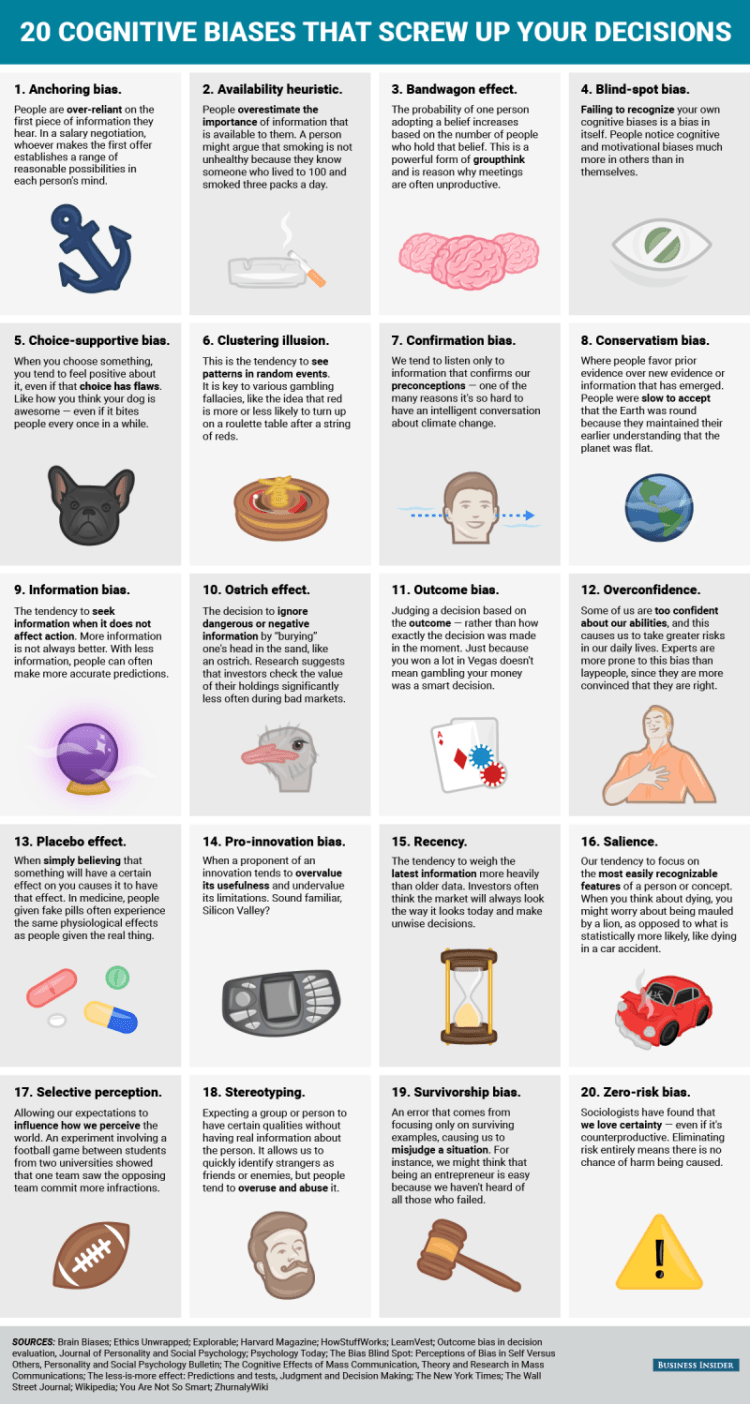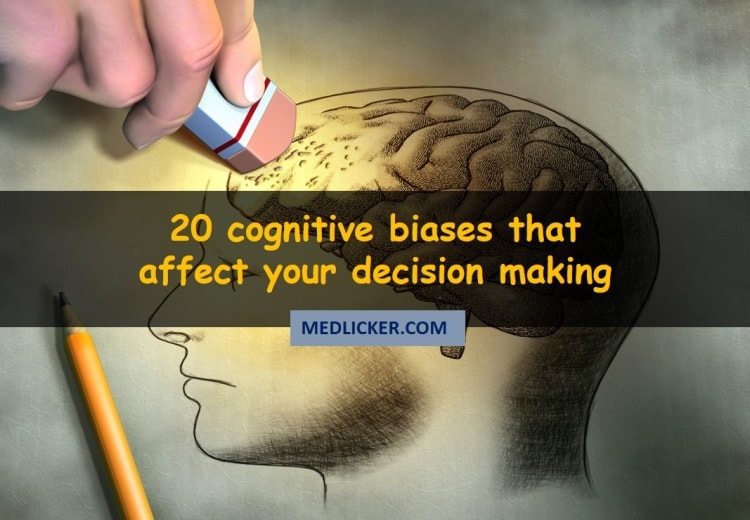20 cognitive biases that affect the way you make decisions
Decision making is not an easy process. While everyone sometimes makes a bad decision many of us just keep making wrong decisions each and every day. Have you ever wondered why we keep repeating the same mistakes? This post (and infographic) features 20 cognitive biases that may hinder your decision making process.
1. Anchoring bias
We often rely on the first information we hear. So one needs to be very careful not only when negotiating salaries but also – for instance - when talking to patients (doctors should really follow this advice :) as it may be very easy to do harm if the patient was first informed that about 80% of people with the same disorder usually die within a year or so while in the end further tests reveal that the patient was actually suffering from something else.
2. Availability heuristic
We tend to overestimate the importance of information we hear. This is why heavy drinkers or smokers often argue with their doctors about negative effects of heavy drinking/smoking on their health claiming that their grandfather died peacefully at the age of 102 in spite of the fact that he drank 2 bottles of wine a day or smoked 60 cigarettes a day.
3. Bandwagon effect
People tend to follow other people. In a meeting this means that the more people have the same opinion the more people will tend to adopt it, as well. Group thinking may be one of the reasons why meetings are such a waste of time.
4. Blind-spot bias
It is much easier to watch the others and recognize what they do well (or not) than to actually recognize one's own cognitive biases.
5. Choice-supportive bias
We tend to stick to choices we made although they might have been completely wrong. For instance you may think that your colleague is a great doctor even if you often need to adjust medication doses prescribed by him/her to avoid overdose.
6. Clustering illusion
Do you often see patterns in random events? Then you might be suffering from clustering illusion, which is one of the main reasons doctors sometimes make bad decisions after seeing lots of patients with the same disease (they think that the symptoms are similar and follow a certain pattern, while in reality it is far from being true).
7. Confirmation bias
Confirmation bias means that we only listen to information that confirm our preconceptions. People suffering from this bias tend to be terrible teachers, scientists or doctors.
8. Conservatism bias
Sometimes we tend to stick with prior evidence and do things we always have been doing. We are slow to accept that cholesterol might actually not be so bad for our heart as we used to be taught that it should be avoided at all cost if we wanted to decrease a risk of having a heart attack.
9. Information bias
Information overload is a reality and we sometimes search for more information on a topic although we actually do not need to do so. Too much information then harms our decision making capability.
10. Ostrich effect
Ostrich likes to hide their head in the sand if he fears or does not like something. We, humans, tend to act in the similar way when making decisions. But ignoring negative or dangerous information will lead us nowhere and the decision will still have to be made.
11. Outcome bias
Many people base their decisions on past outcomes. But just because a patient survived a meningitis without being given any antibiotics does not mean that skipping antibiotics was a smart decision.
12. Overconfidence
Some people like taking great risks in their daily lives as they are over confident about their abilities. Famous doctors or scientists tend to suffer from over confidence much more than normal people as they are convinced that they are always right. However a disaster usually strikes when we get too confident.
13. Placebo effect
Placebo effect is known in medicine and it means that people believe that by taking a fake pill with no active ingredient they will experience the same results as patients given the actual medication with the active ingredient. In decision making process this bias means that we expect to get a certain effect by just believing that something we did would have such effect.
14. Pro-innovation bias
Again, scientists are frequently victim of this bias. They tend to overvalue usefulness of their inventions while undervaluing their limitations.
15. Recency bias
Sometimes we tend to value new information more than the old information. In research this may mean that doctors may stop using aspirin for fever treatment and start using NSAIDs (ignoring the fact that aspirin actually does less harm to the gut than NSAIDs).
16. Salience
People tend to focus on the most easily recognizable features. For instance when thinking about a graduation exam you may worry about not passing the exam because of the fact that you forgot your exam brochure - which is a pre-requisite for being able to take the exam – at home while statistically it is much more likely that you will not pass the exam because of the fact that you will not answer the questions correctly.
17. Selective perception
We tend to let our expectations affect our way of perception of the world. A bad guy will always expect the worst while a good guy usually expects the best.
18. Stereotyping
Sometimes we tend to expect that products have certain qualities without actually having any supporting information. Such expectations are good to identify products as useful or useless but we should not abuse or overuse this strategy.
19. Survivorship bias
Sometimes we misjudge a situation as we only make decisions based on examples made available to us. For instance you may buy a great business course, which should teach you how to earn one million bucks in a year selling products on Amazon, yet when you actually buy the course and follow the instructions you will learn that becoming rich is not that easy as you did not have all information before purchasing the course (e.g. mainly information about the majority of purchasers, who actually purchased the course and failed to earn a dime).
20. Zero-risk bias
People tend to love certainty even if it is not good for them. We think that by eliminating all risks there is no chance of any harm being caused.Infographic
Here is a great infographic summarizing all above mentioned biases, which negatively affect our decision making (source: Business Insider).

| Written by: | Michal Vilímovský (EN) |
|---|---|
| Education: | Physician |
| Image resources: | Dollarphotoclub.com and Business Insider |
| Published: | November 24, 2015 at 3:06 PM |
| Next scheduled update: | November 24, 2017 at 3:06 PM |
Get more articles like this in your inbox
Sign up for our daily mail and get the best evidence based health, nutrition and beauty articles on the web.


Ache in left arm that you should not ignore
Alkaline water dangers: why you should not drink it
How to Avoid Sleepiness While Studying?
23 Foods That Increase Leptin Sensitivity
Low dopamine (e.g. dopamine deficiency): causes, symptoms, diagnosis and treatment options
Swollen taste buds: the ultimate guide to causes, symptoms and treatment
Thin endometrial lining: causes, symptoms, diagnosis and treatment
Pimples inside nose: the complete guide
Holes in tonsils: definition, symptoms, treatment and prevention
How to deal with an ingrown hair cyst
Allegra vs. Zyrtec vs. Claritin
Allergy to penicillin and alternative antibiotics
How to get rid of phlegm (excessive mucus) in throat? Detailed guide to medical and home remedies, symptoms and causes
What causes stomach ache after meals?
Liver blood test results explained